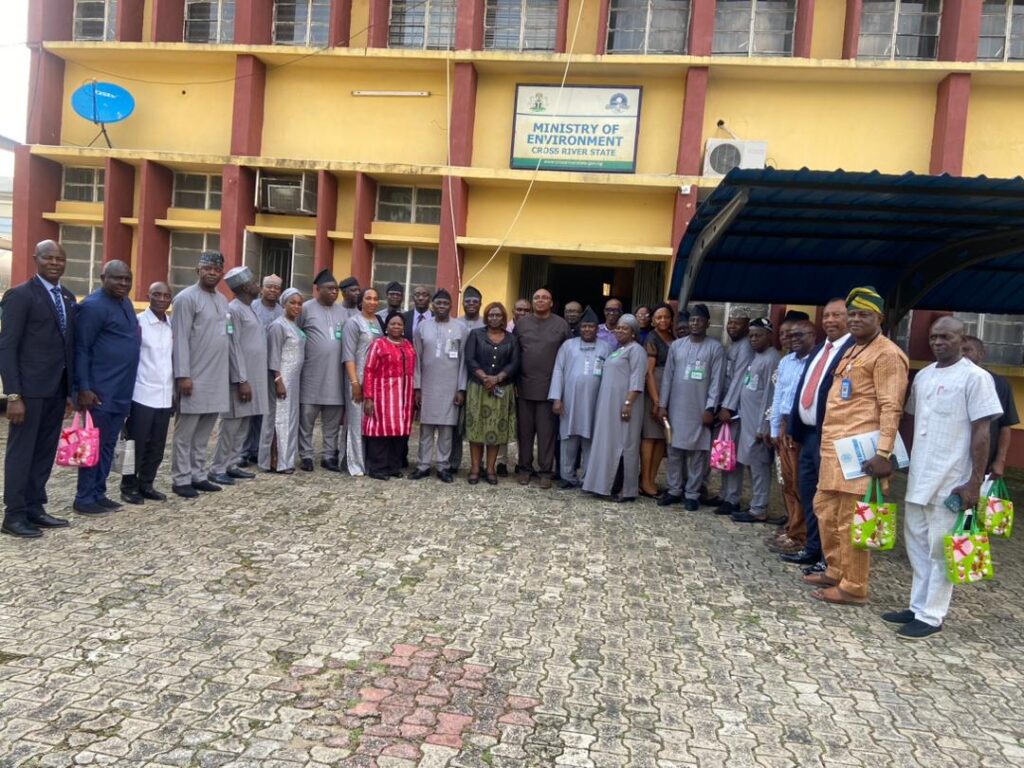From Musa Muhammad Kutama, Calabar
The Cross River State Government has received participants of the Senior Executive Course (SEC) 47, 2025, from the National Institute for Policy and Strategic Studies (NIPSS), Kuru, as part of their local study tour aimed at fostering national development through strategic engagements.
Welcoming the delegation at the Ministry of Environment headquarters in Calabar, the Commissioner for Environment, Hon. Moses Osogi, described the visit as timely and strategic, considering the relevance of the blue economy to coastal states like Cross River. Osogi, who was represented by the Permanent Secretary, Barr. Mrs. Rosemary Onah, said the administration was already putting modalities in place to harness the vast potential of the marine sector.
“The blue economy holds significant prospects for job creation, food security, and sustainable development in Cross River,” Onah said. “Governor Sen. Bassey Edet Otu’s administration is committed to policies that unlock the full value of our marine and ecological resources.”
Leading the NIPSS delegation, Brigadier General L.A. Jimoh thanked the state government for its warm reception. He explained that NIPSS, since its establishment in 1979, has trained top-level executives to tackle Nigeria’s pressing challenges, describing the study tour as an integral part of the training.
“This visit to Cross River is not just ceremonial—it’s a critical engagement that enhances our capacity to make evidence-based policy recommendations,” Jimoh said. “We are grateful to Governor Otu for his swift response and support.”
The Brigadier General also acknowledged the Ministry’s pivotal role in environmental sustainability and the blue economy agenda, stating that the team would incorporate findings from the visit into their final report.
During the interactive session, the Director of Ecology and Biodiversity, Mr. Sonigitu Ekpe, delivered an in-depth presentation on the state’s strategic advantages. He noted that Cross River’s access to the Atlantic Ocean positions it as a leader in blue economy activities such as fisheries, shipping, aquaculture, and marine tourism.
“With the right regulatory framework, maritime infrastructure, and stakeholder participation, the blue economy can significantly boost state and national GDP,” Ekpe said. “However, governance gaps, inadequate infrastructure, and climate change remain serious challenges.”
Ekpe urged the NIPSS team to consider policy directions that support marine research, environmental protection, and community engagement in their recommendations.
Also speaking, the Director of Environmental Quality Control and Standard Enforcement, Mr. Akpa Akpa, reiterated the Ministry’s commitment to making Cross River a model for environmental best practices across Nigeria. He emphasized the importance of promoting public health, reducing pollution, and advancing a circular economy.
“Our vision is to drive compliance, innovation, and enforcement that align with global environmental standards,” Akpa said.
The NIPSS participants comprise a diverse mix of professionals, including senior military and police officers, academics, federal and state permanent secretaries, and members of the legal profession, reflecting the multidisciplinary nature of the course.
The team is expected to conclude its tour with a detailed report on how Cross River’s experience and initiatives can inform broader national policy on the blue economy and sustainable development.


